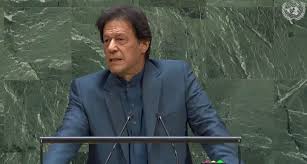As one follows Imran Khan’s career over the last few years, particularly since helming Pakistan’s shaky democracy, one cannot but see a number of close similarities between him and Sheikh Mohammad Abdullah, the founder of Kashmir’s Abdullah dynasty.
Ambitious to the core
Sheikh Abdullah returned to Kashmir after completing his studies at Aligarh in April 1930, to form the Reading Room Party along with three other colleagues. Ever since, his ambition was to emerge as the sole centre of power which would decide the fate of Kashmiris. Sheikh often spoke in contradictory terms even on most crucial issues, as long as it helped him further his own political career. Same is true of Imran Khan who, after returning to Pakistan from abroad, has let his ambition override all other considerations. In the west, where he spent a considerable period of his youth, he projected himself as a liberal modern-day playboy. But in Pakistan, realizing that with his western liberal image would negate any chance to create political space for himself in a deeply conservative society, he soon adopted a different approach, even to the extent of divorcing his Jewish wife and joining hands with the most radical elements.
Used everyone who mattered
At various stages of his life Sheikh Abdullah used every one who mattered irrespective of what that person’s political philosophy was. From Jinnah to Nehru, from Mir Waiz to the Dogra ruler, and from Qadianis to Pandits, Sheikh Abdullah used every one to climb up the political ladder. Same is true with Imran Khan, who used the Army, the ISI, the Taliban, and the radical Islamists like Mohammad Tahir Ul Qadri and others to emerge as a challenger to the established political order.
Disloyal to ‘Friends’
Without the support of the Mir Waiz Maulvi Yousuf Shah in the initial years of Sheikh Abdullah’s political career, the latter’s activity would have remained confined to a small circle restricted to the Reading Room. Or for that matter, without the support of other Muslim Conference leaders, he would have ended up as a sectoral leader. Without the patronage of Nehru, Sheikh would have been consigned to the foot notes of history. But despite all that, he showed utter disloyalty to all of them after having made the best use of their support at crucial junctures of his political. Same is true about Imran Khan, who would have been nothing without the initial support of former ISI Chief Hamid Gul, the Army establishment or the religious political outfits, whom he is opposing today.
Communalists
Sheikh Abdulla, from the very early stages of his political life, hid his real face behind a façade of secularism, coining terms like ‘Kashmiriyat’ and ‘Sher-i-Kashmir kakyaIrshad: Hindu Muslim Sikh itehad’, but all his actions were dictated by his communal agenda. He would always start his speech with a Quranic Ayat and would motivate the masses to rise against the ‘Hindu’ Dogra Ruler. All his political and later administrative decisions were aimed at creating a Muslim majoritarian Sheikhdom. In the process, he laid the foundations of Muslim communalism becoming a state policy under the garb of so called secularism. Though Imran became a twice-born Muslim due to political compulsions, the fact is that he does everything now quoting the Islamic addicts, even playing second fiddle to his third wife Bushra Begum, who is some kind of a Muslim cleric.
Power-hungry and Intolerant towards Dissent
There was only one reason that Sheikh Abdullah fell afoul of Jinnah and other leaders of the Muslim Conference; it was Sheikh Abdullah’s unwillingness to share power with any one, as he considered himself the sole leader of Jammu and Kashmir and was unwilling to play second fiddle to Jinnah or to the Muslim Conference leaders like, Abbas. When his patron, Nehru, sent him as part of Indian delegation to the United Nation, Sheikh said, rather undiplomatically during his speech, “There is no power on earth which can displace me from the position which I hold there (J&K).” As Sheikh Abdullah grew politically taller, he became dictatorial and intolerant of dissent. At the fag end of his life he fell out even with is most loyal friend ad alter ego, Mirza Afzal Beig. Imran Khan is no different. The kind of political opportunism he showed while handling the Vote-of -No-Confidence in his government is clear indication of his power-hungry nature and little tolerance for dissent. By dutifully following the due constitutional process, Imran would have contributed to strengthening the fledgling democracy of Pakistan. But he did not do so, as hold on power is all that matters to him.
Scant Regard for Principles
Sheikh Abdullah showed little regard for principled conduct which contributed substantially to creating the Kashmir imbroglio. On many occasions he announced publically his complete loyalty to India and opposed Pakistan’s theocracy as a regressive basis of nationhood. Later, after gaining power, he went back on his promise, compelling is own mentor, Nehru, to put him under arrest. Though he opposed Maharaja tooth and nail, yet on many occasions Sheikh Abdullah wrote letters of apology to the Maharaja assuring the latter of his complete loyalty. Imran also shows the same scant regard for principles. His contention that his government is being removed on the dictates of America is completely based on his assumption that he will earn huge sympathy of his people. That such a stand by him will end up doing enormous damage to Pakistan, is well known to him. But as long as the argument can help him avoid being ousted, he couldn’t care less for the long-term interests of his own country.





